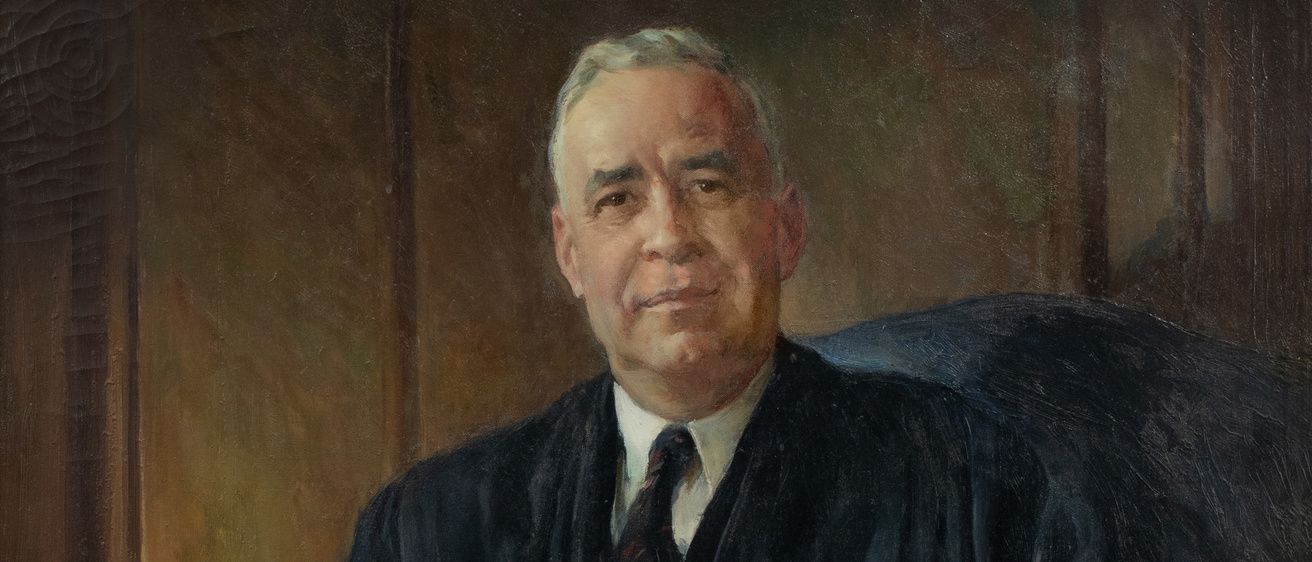Wiley Rutledge served on the Supreme Court from 1943-1949, but it wasn’t until John M. Ferran published “Salt of the Earth Conscience of the Court” that he even received a true biography. Although the brevity of his nine year term has given him less of a historical significance, Rutledge’s service as the dean of Iowa Law has made him an important part of Iowa’s history.
The first couple years of his life were spent in Cloverport, Kentucky where he was raised as a Southern Baptist. Contrary to the teachings from his father who served as the minister, Rutledge slowly stared moving towards Christian humanism once he reached college. With his father having to frequently move from one parish to another every couple years, this changing of residence quickly became a pattern in Rutledge’s life.
While appointing Rutledge as his ninth and final Supreme Court judge, Franklin D. Roosevelt noted that he had quite “a lot of geography” which deemed to be true. Rutledge had attended college in Tennessee and Wisconsin and taught high school in Indiana, New Mexico, and Colorado. When he got diagnosed with tuberculosis in 1916, he became a patient in North Carolina’s state sanitorium
During that time, Rutledge had given up on his original aspiration of being a chemist and moved his focus towards law. While using his B.A. degree from the University of Wisconsin to teach commercial subjects in high schools, Rutledge and his wife saved enough money to allow him to resume his study of law. During the fall of 1920, Rutledge enrolled at the University of Colorado Law School, at Boulder, where he obtained his LLB degree.
After two years of practicing law with the Boulder firm, Rutledge was invited to become a member of the University of Colorado Faculty. Two years later, he was invited to join the law faculty of Washington University in St. Louis where he was appointed dean in 1930. After a couple years, the Rutledges moved once more to Iowa City, where he served as the dean of Iowa Law from 1935-1939.
36 Iowa Law Review described Rutledge as a teacher of law who had “the happy faculty of arousing the interest and latent talents of his students, and of stimulating their best efforts. He was especially attracted by young people and his sincere and genuine interest in his students was rewarded by their warm and abiding affection. Throughout the late world war, in spite of the increasing cares and burdens of his judicial office, he found time to carry on a thoughtful and extensive correspondence, frequently in longhand, with former students stationed throughout the world in the various branches of the armed services, and these students felt free to write to him for inspiration, encouragement, and advice. To his former students he was always, in spite of his exalted position, still a good friend and adviser.”
Although Rutledge’s geography was one of the assets that brought him to Franklin Roosevelt’s attention, he had also been a thorough New Dealer, who had taken progressive positions that included hard work to prevent child labor and a professionally unpopular backing of the Court-Packing Plan. As phrased in Ferren’s publishing, Rutledge was a “public liberal” and as a professor of the law of business organizations, he denounced "pirates of industry and finance.” He was seen as the “conscience of the Court,” being the most reliable “champion of civil liberties, civil rights, and exact procedural fairness.”
Rutledge’s dissent in Yamashita has been seen as his greatest achievement from the time he spent serving on the Supreme Court. During this case, the Court declined to disturb the death sentence imposed by a military commission on a Japanese general for war crimes assertedly committed by troops under his command in the Philippines in the last year of World War II. However, the military commission's procedures, which did not remotely conform to the procedures governing courts martial, were a travesty of due process.
"More is at stake than General Yamashita's fate. There could be no possible sympathy for him if he is guilty of the atrocities for which his death is sought. But there can be and should be justice administered according to law. In this stage of war's aftermath it is too early for Lincoln's great spirit, best lighted in the Second Inaugural, to have wide hold for the treatment of foes. It is not too early, it is never too early, for the nation steadfastly to follow its great constitutional traditions, none older or more universally protective against unbridled power than due process of law in the trial and punishment of men, that is, of all men, whether citizens, aliens, alien enemies or enemy belligerents. It can become too late,” expressed Rutledge while he was working in the case.
On September 10, 1949 Rutledge passed away from a cerebral hemorrhage, ending his service on the Supreme Court. His term was not as long as others but Rutledge still left is mark on serious constitutional issues that remain with us today.
